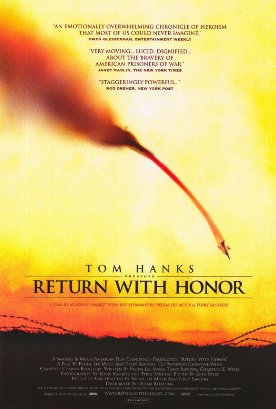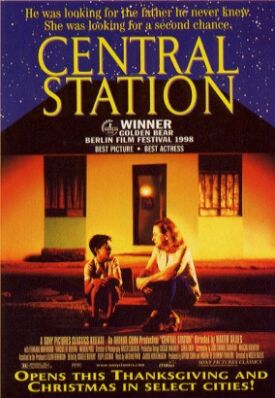Return With Honor
It would be presumptuous of me to review Return With Honor, a documentary directed by Freida Lee Mock and Terry Sanders, who also co-wrote it with Christine Z. Wiser. Both the writing and the direction are quite unobtrusive, and the picture consists almost entirely of interviews with American prisoners of war, most of them Navy or Air Force pilots, who were held in North Vietnam between 1965 and 1973. With a bit of stock footage of the war — and in some cases of the men’s capture — these are edited so as to produce a roughly chronological narrative, held together by certain recurring themes including capture, torture, the hardships of prison life, the spiritual resources which helped men to get through the experience and so forth. One experiences the interviews simply as the men telling their own stories, and such stories as to render criticism respectfully mute.
Only at one or two points does the movie become political. One of the POWs, Ron Bliss, says that after a while their North Vietnamese captors stopped bombarding them with Communist propaganda and simply showed them the speeches of liberal, anti-war politicians back home. As he tells us this, the film cuts to a contemporary picture of Ted Kennedy appearing on “Meet the Press.” The prisoners were also shown footage of anti-war demonstrations in the U.S. for the same purpose. But for the most part, the movie attempts to prove no point about the war or the people who fought it on either side except for the rather obvious one that the North Vietnamese were often cruel to prisoners and that there is every reason to believe that these prisoners bore their sufferings like soldiers.
But of course the filmmakers do not have to tell us that, in the aftermath of Vietnam and perhaps partly as a result of these men’s experiences, just behaving like a soldier was to become a political act. James Stockdale here reveals that he was told by a senior North Vietnamese official that the prisoners were always intended to be used as propaganda weapons, and so any refusal to cooperate with that purpose even in the name of solidarity with one’s comrades, had political implications. Part of what made war less than the ghastly horror it has become in our century was that both sides, however they might have differed in other ways, had the same idea of honor. Even in the two World Wars, enemies paid tribute to their adversaries’ courage and fighting ability, the same soldierly qualities that they themselves valued. It was only with the Cold War that honor became politicized and we began to see the revolting spectacle of prisoners tortured not for information or even revenge but just for the dubious pleasure of turning them into ideological automata.
Even the North Vietnamese eventually seemed to realize that the few occasions on which they tried to stage propaganda events involving the prisoners — as when Jeremiah Denton blinked out the word “torture” in Morse Code, or film was shown of the prisoners being attacked by a mob of angry “workers” — were counterproductive. Yet it was in the nature of ideological warfare, both the Vietnamese and the American versions of it, to scorn what were otherwise the most universally honored of soldierly qualities if they were not placed in the service of the revolution. That made it even more remarkable that the American soldiers were so faithful to a standard that so many on both sides considered outmoded. As Ron Bliss puts it, “all that we had left was our name and our honor” — which is why honor became so important and why, as another former prisoner, Ed Mechenbier, says, “Return With Honor” became the slogan and symbol for the POWs’ aspirations.
From the prisoners’ point of view, the most delicate of subjects is how far it was possible to resist the torture. There is no attempt to romanticize the ability of the men to stand up to the pain. Mike McGrath, a prisoner who used his own blood and pus to draw on the walls and shows us some surviving samples of his art works acknowledges that all could be broken, but all (or nearly all) did the best they could to resist. Than this, he said, no more could be asked, even if in one case a man’s best meant giving up secrets after a slap in the face and in another it meant holding out until death. In the context this seems to be a perfectly logical argument and represents what must have been one of many accommodations between honor and harsh reality until the day when, with an emotion that returns both for them and for us, they came home again. Even some of the home grown and (as we may now say) ad hoc ideologues of the period may find themselves watching the final scenes of this terrific movie with a lump in their throats.
Discover more from James Bowman
Subscribe to get the latest posts to your email.







